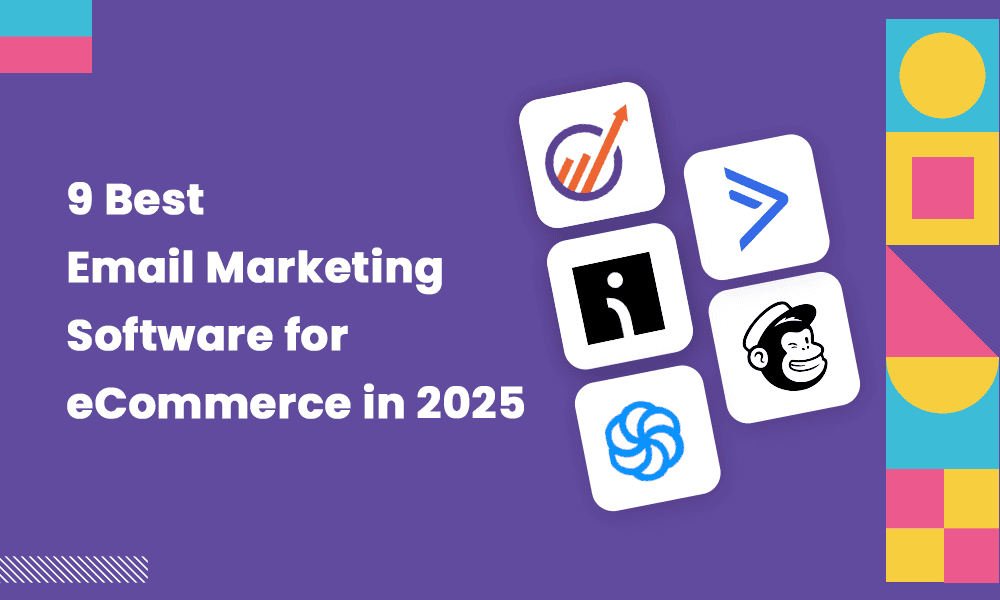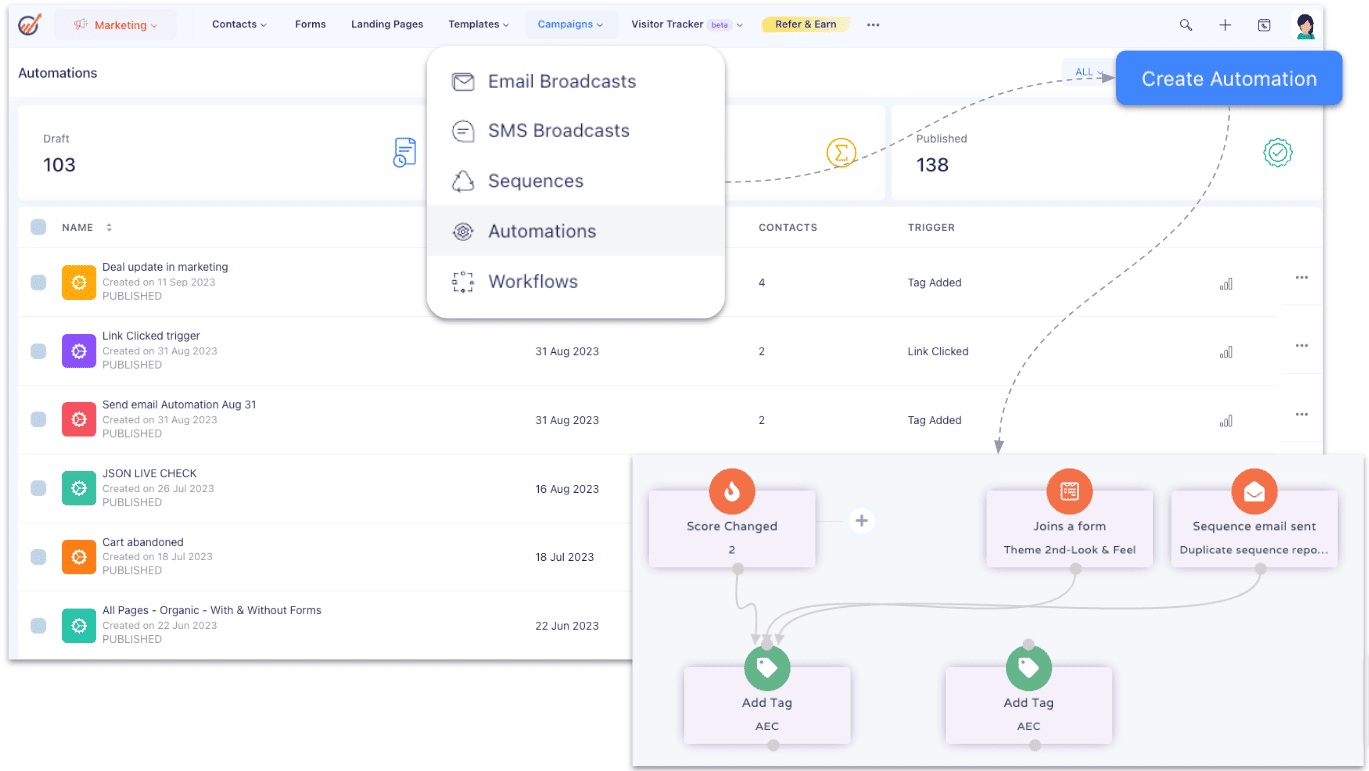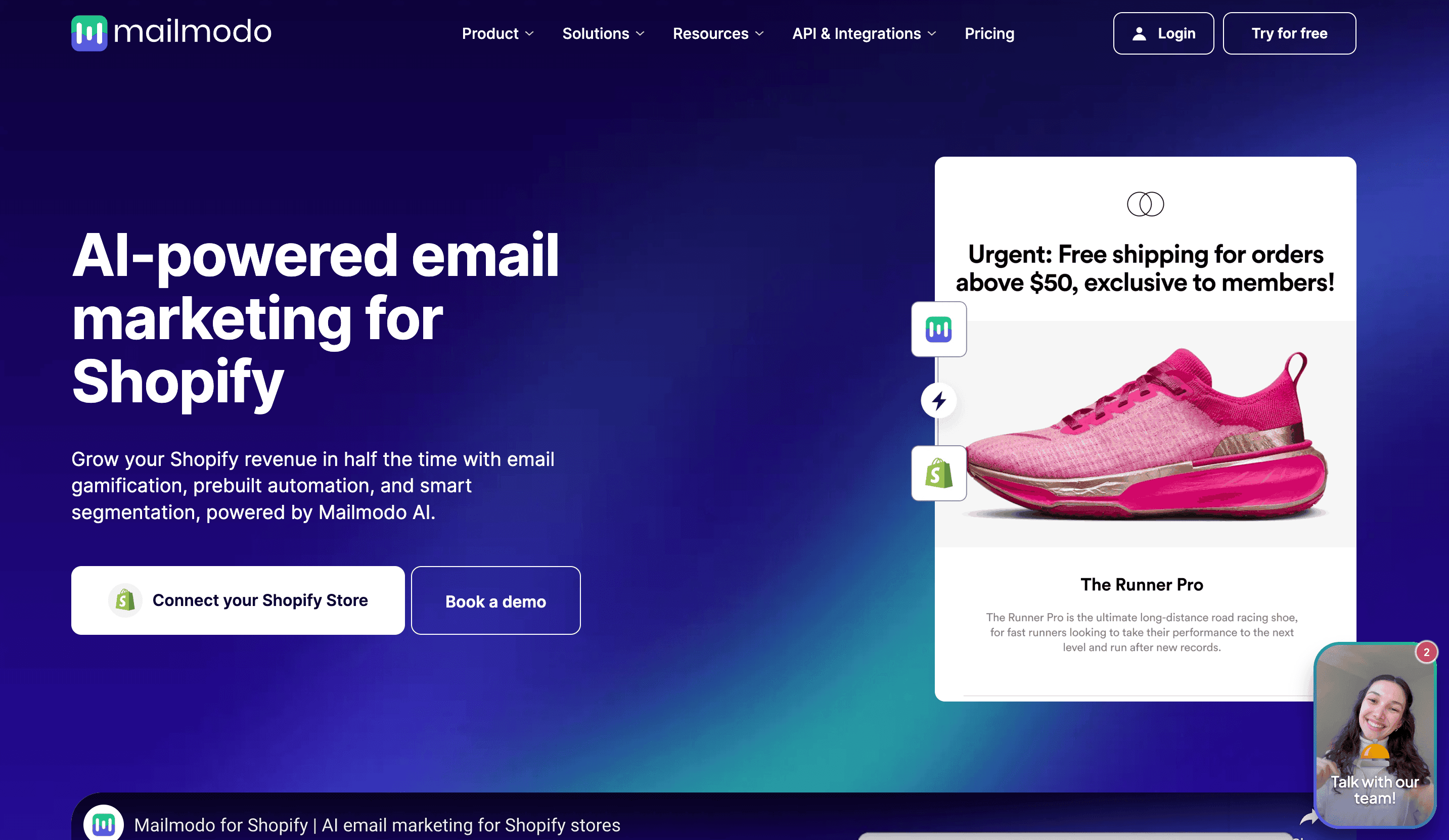What if I told you that there’s an easier way to get new leads for your eCommerce company? And you won’t be putting in those extra late-night hours at the office either!
Wait, there’s more! This marketing channel has given many marketers an ROI of up to $42 for every $1 spent!
Could you guess what this is?
That’s right, I’m talking about email marketing for eCommerce! If you’re not already doing this, you better jump on the bandwagon real soon. All your competitors are already doing this, so there’s no logic in missing out!
An email marketing software makes this journey a whole lot easier for you.
An email marketing platform allows you to manage the entire process of your email marketing from start to finish.
A powerful email marketing tool for eCommerce will allow you to build and manage sturdy email lists, optimize emails for maximum conversions, and automate your workflow, among other things!
So, we have curated the ultimate list of top email marketing software for your eCommerce platform to make your life just a little easier in 2025.
Table of Contents
What are the Benefits of Using eCommerce Email Marketing Software?
If you’re not already sold on the idea of email marketing software, let us break it down for you.
- Increased customer engagement: Regular email marketing allows your eCommerce platform to remain fresh in the minds of prospects. It’s a surefire way to boost customer engagement with your brand.
- Send personalized emails: Email marketing software makes it a piece of cake to personalize your emails for different segments of your email list.
- Save time with email marketing automation: Once your software is set up and ready to go, you can automate email chains based on customer behavior.
- Boost your content marketing through emails: Email marketing is a great way to send out newsletters and other content at regular intervals to your prospects. You can promote your best content through emails.
- Get live, actionable data for your campaigns: Most email marketing tools will monitor data like click-through rates, bounce rates, and open rates. This will give you live data on the performance of each email marketing campaign. In the long run, this creates a snowball effect, where your future campaigns get better conversions.
These are just some of the common benefits that a majority of eCommerce marketers have reported.
Remember, choosing the perfect email marketing platform for your eCommerce business would ensure that you get even more benefits out of it.
Read More: 7 Powerful eCommerce Marketing Automation Strategies + Tools
9 Best Email Marketing Software for eCommerce in 2025
After extensive research, here are our top picks for email marketing tools for the eCommerce industry.
| Email marketing software for eCommerce | Starting price | Free plan | G2 rating |
| EngageBay | $12.74/month for 750 contacts | Yes | 4.6/5 |
| Omnisend | $20/month for 1,000 contacts | Yes | 4.6/5 |
| Brevo (Sendinblue) | $25/month for 20K emails | Yes | 4.5/5 |
| ActiveCampaign | $15/month for 1,000 contacts | No | 4.5/5 |
| GetResponse | $19/month for 1,000 contacts | Yes | 4.2/5 |
| Mailchimp | $13/month for 500 contacts | Yes | 4.3/5 |
| HubSpot | $15/month for 1,000 contacts | Yes | 4.4/5 |
| Kit (ConvertKit) | $25/month for 1,000 contacts | Yes | 4.4/5 |
| Mailmodo | $149/month for 500 contacts | No | 4.5/5 |
1. EngageBay
Best all-in-one marketing, sales, and CRM solution for small businesses
Launched in 2017, EngageBay is a one-stop, integrated marketing, sales, and CRM platform aimed at small and fast-growing eCommerce businesses.
This cloud-based CRM solution has three major segments — Marketing Bay, Sales & CRM Bay, and Service Bay. EngageBay has now emerged as one of the leaders in the all-in-one CRM solution game.
Features and benefits
- Centralized sales and marketing dashboard: Track customer interactions, email campaigns, and sales data, all from one place.
- Pre-built email templates for eCommerce: Choose from a vast library of conversion-focused email templates for promotions, product launches, and cart recovery.
- Abandoned cart recovery: Set up automated email sequences to recover lost sales and bring customers back to complete their purchases.
- Marketing automation for eCommerce: Automate follow-ups, welcome series, and loyalty campaigns with workflows tailored for online stores.
- Advanced sales analytics: Gain insights into revenue trends, customer lifetime value, and email campaign performance with built-in reporting.
| Pricing |
|
| Trial Period | It offers a free trial period for all pricing plans |
| Customer Support | 24/7 live chat & email support for all users, phone support for ‘Pro Plan’ users. |
| Pros |
|
| Cons |
|
Learn more about EngageBay:
Sign up with EngageBay for free
2. Omnisend
Best for growing eCommerce brands
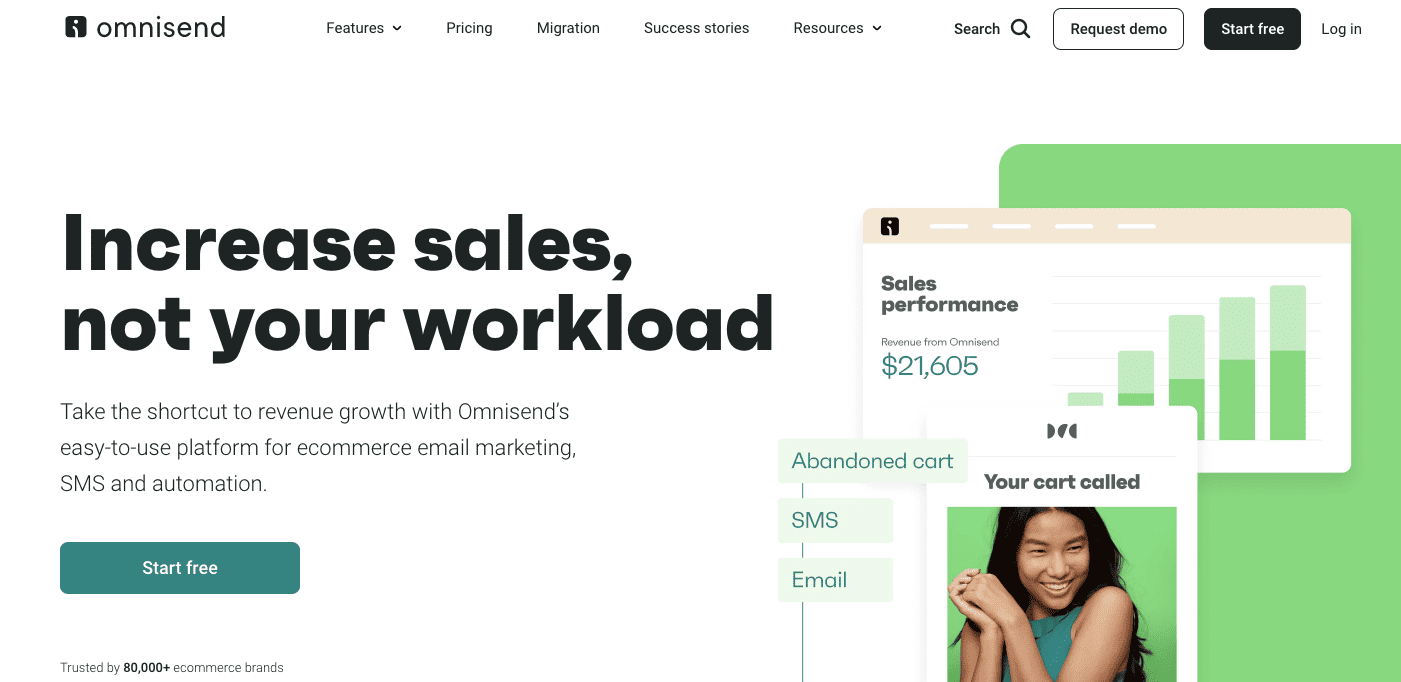
This is an example of an omnichannel marketing automation solution, with a focus on eCommerce. Omnisend was started in 2013, and the name itself is a nod to omnichannel marketing solutions offered by the platform.
If you are an eCommerce business that’s growing fast, this might be a good option for you.
Features and benefits
- Option to create automated workflows and integrate several marketing channels like email, SMS, push notifications, WhatsApp notifications, etc.
- Offers a variety of pre-built, eCommerce-specific automated sequences for situations like cart abandonment, browse abandonment, etc.
- Real-time reporting of email marketing campaign performance along with customer segmentation.
- It offers easy third-party integrations with most eCommerce platforms like Shopify.
| Pricing |
|
| Trial Period | 14 Days Free Trial Period |
| Customer Support |
|
| Pros |
|
| Cons |
|
Looking for a more flexible solution to Omnisend? Our article on the top Omnisend alternatives will help you find the perfect fit.
Read also: ECommerce Email A/B Testing Basics For Beginners
3. Brevo (Sendinblue)
Best all-in-one marketing, sales, and CRM solution for small businesses
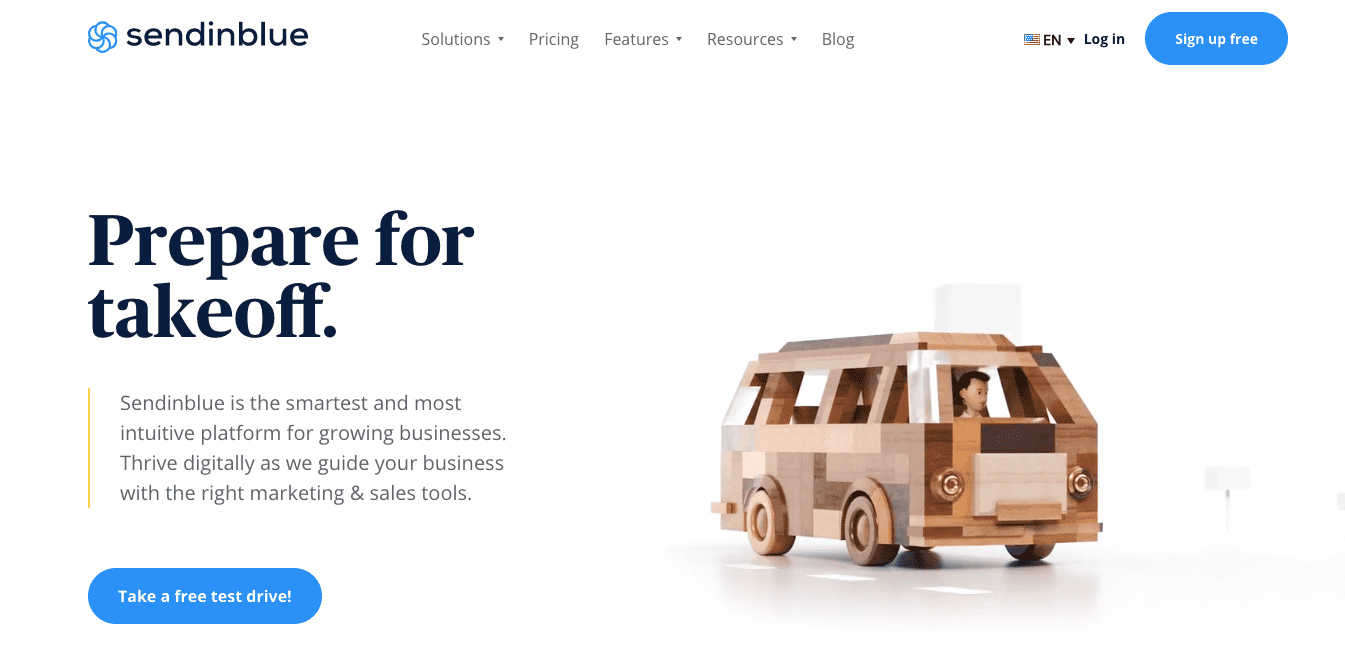
Sendinblue (Brevo) is an all-in-one marketing and CRM platform that’s suitable for eCommerce businesses of all sizes. Launched in 2012, this platform stands out for allowing unlimited contacts for every pricing plan!
Features and benefits
- Its easy-to-use drag-and-drop email editor allows you to send emails for almost any kind of email marketing campaign.
- Excellent marketing automation features, with a dedicated transactional email section that’s integrated with WhatsApp and SMS notifications.
- Easy integration with third-party apps like Shopify and WooCommerce.
- Excellent pricing plans, with the small downside of a 300 email limit per day in the ‘Free Plan.’
| Pricing |
|
| Trial Period | Free Trial Period for 30 days |
| Customer Support | Email support for ‘Free’ and ‘Starter’ plan users, phone support for ‘Business’ and ‘Enterprise’ plan users |
| Pros |
|
| Cons |
|
👉Want to find a Sendinblue (Brevo) alternative that’s better suited to your needs? Check out our article on the top Sendinblue (Brevo) alternatives.
4. ActiveCampaign
Best for advanced automation and omnichannel messaging
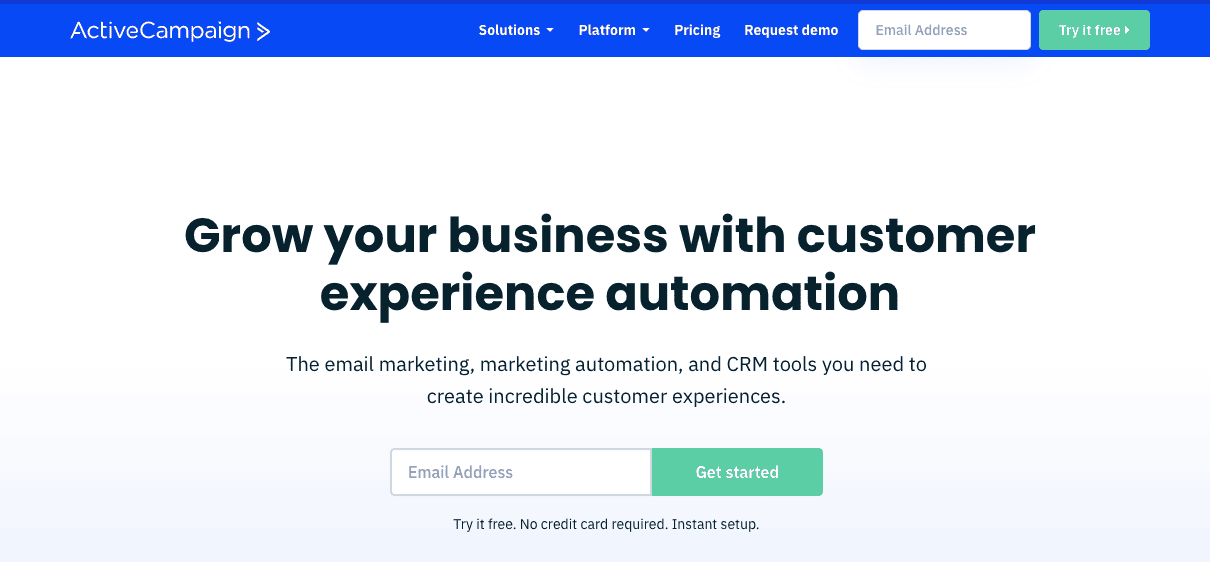
ActiveCampaign began as a consulting firm back in 2003, this platform has now grown to become one of the leaders in the customer experience automation (CXA) market. This could be the right fit for your eCommerce business, especially if you are looking for powerful marketing automation tools that cost a tad more.
Features and benefits
- ActiveCampaign offers efficient marketing automation features where you can build automation from pre-built templates for abandoned cart emails, sign-up forms, etc.
- Great omnichannel messaging options that can be integrated with your email campaigns.
- Offers comprehensive third-party integrations with eCommerce platforms like Shopify and BigCommerce.
- Great features for A/B Testing and email deliverability.
| Pricing |
|
| Trial Period | Free trial for 14 days |
| Customer Support | Free email & chat support for all plans
Free data migration for all plans |
| Pros |
|
| Cons |
|
Read more: 9 Automatic Emails You Should Have for Your eCommerce Store
5. GetResponse
Best for email testing and analytics-driven campaigns
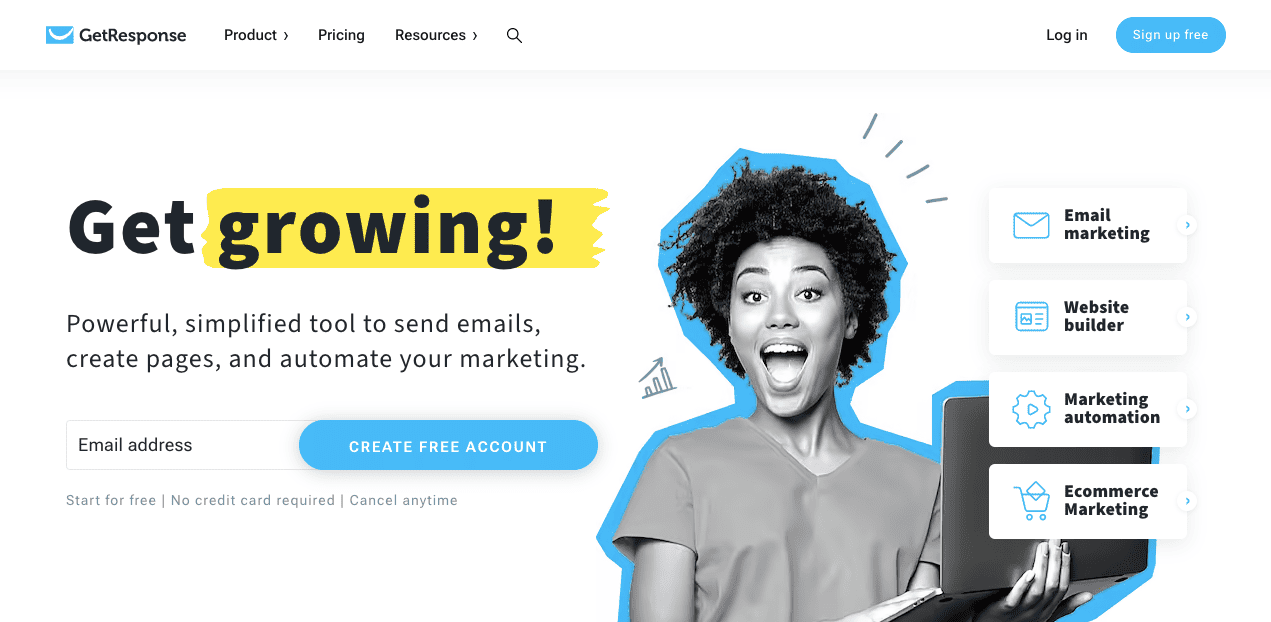
Founded in 1997 with the launch of its first autoresponder, GetResponse’s initial goal was limited to email marketing. It has since evolved into a more all-in-one marketing solution rather than a traditional email marketing software.
So, GetResponse also offers features like drag-and-drop website and landing page builders, eCommerce management, and webinar hosting.
Features and benefits
- It offers excellent email testing features that are some of the best in the market.
- The reports and analytics offer the users an in-depth insight into the performance of marketing campaigns.
- There are powerful marketing automation and lead segmentation features; however, they aren’t available with the free plan.
- There’s an option to monitor your Facebook and Instagram ads directly from the GetResponse dashboard.
- The transactional email feature allows you to link its API or SMTP to send out transactional emails.
| Pricing |
|
| Trial Period | 30-day trial period |
| Customer Support | 24/7 live chat and email support |
| Pros |
|
| Cons |
|
👉Ready to elevate your eCommerce platform? Uncover the top CMS options in our extensive guide! 🏆
6. Mailchimp
Best for ease of use and broad third-party integrations
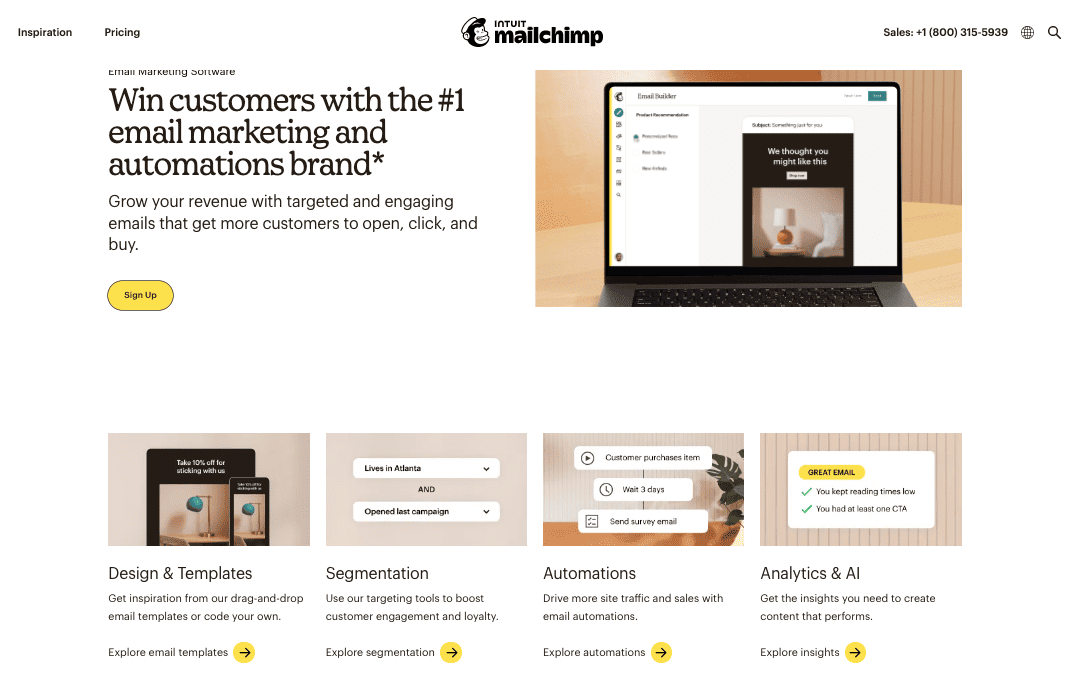
Mailchimp is an all-in-one marketing platform that has now become one of the established players in the game after its launch all the way back in 2001.
Mailchimp is known for its efficient email marketing features and marketing automation. It offers around 45 pre-built automation templates that are well-suited for eCommerce companies.
Features and benefits
- Offers excellent reports and analytics for eCommerce companies. You can track the performance of your campaigns through a 24/7 tracker and even compare your performance with that of your competitors.
- It offers excellent features even in the free plan. However, A/B testing and email scheduling are unavailable for this pricing plan.
- The user interface is simple and quite easy to start using.
- There are around 800 third-party integrations available.
| Pricing |
|
| Trial Period | 30-day trial period |
| Customer Support | Only email support for ‘Free Plan’ users; live chat, and email support for all other pricing plans |
| Pros |
|
| Cons |
|
Read also: How To Move From Mailchimp to EngageBay: An Exhaustive Guide
7. HubSpot
Best for scalable enterprise-grade marketing automation
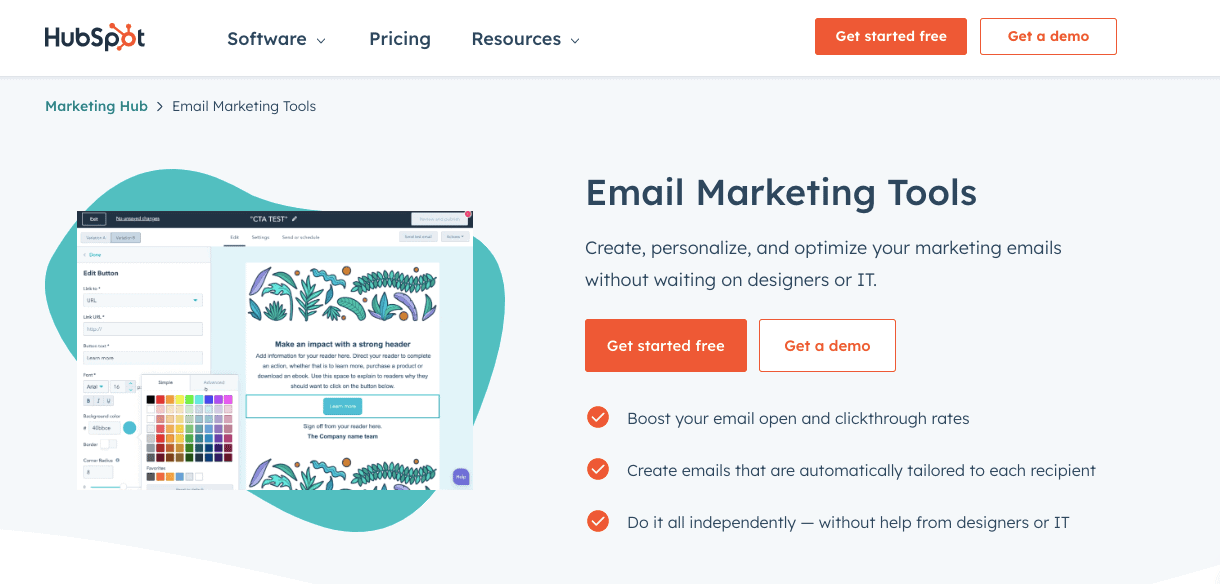
Launched in 2006, HubSpot offers extensive email marketing solutions as a part of the HubSpot Marketing Hub. As one of the leaders in the marketing automation game, HubSpot offers an all-in-one marketing platform aimed at small and large eCommerce businesses alike.
Features and benefits
- HubSpot offers dozens of free templates, email scheduling up to a year in advance, and automatic mobile optimization features that can all be tracked on the email dashboard.
- Excellent workflow-based marketing automation features.
- View the effectiveness of your email campaigns with live analytics on your email dashboard.
| Pricing |
|
| Trial Period | 14-Day Free Trial |
| Customer Support | No direct support for free users, Email and chat support for ‘Starter Plan’ users, phone support for ‘Professional Plan’ users |
| Pros |
|
| Cons |
|
Read also: Is HubSpot CRM Free? An Unbiased Guide (with User Reviews)
8. Kit (ConvertKit)
Best for content creators and digital entrepreneurs
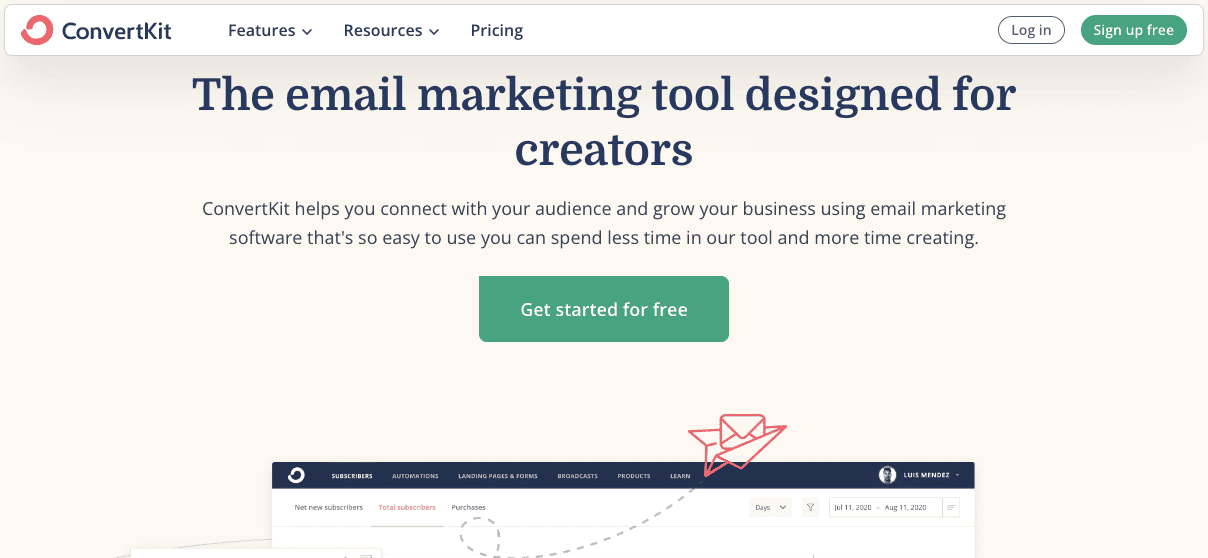
ConvertKit was launched in 2013 and was aimed at bloggers, YouTube content creators, and podcasters. It has since evolved to offer email marketing to eCommerce marketers as well. One advantage of ConvertKit is that it offers unlimited landing pages, sign-up forms, and broadcasts in the ‘Free’ pricing tier itself.
Features and benefits
- ConvertKit has a very versatile tagging and segmentation system, which is great for eCommerce companies to run targeted email marketing campaigns.
- There is the option of adding a custom domain to sell ebooks, online courses, and other products easily. There is a small transaction fee of 3.5% for each product sold.
- ConvertKit makes it very easy to add or remove subscribers from workflows due to its efficient tagging system.
| Pricing |
|
| Trial Period | 14-day free trial |
| Customer Support | Community support for ‘Free Plan’ users, Live chat & email support for ‘Creator Plan’ and ‘Creator Pro Plan’ users |
| Pros |
|
| Cons |
|

Read more: 13 ConvertKit Alternatives That Make Sense For Small Business Owners
9. Mailmodo
Best for interactive AMP-powered email marketing
Mailmodo is an advanced email marketing software that offers businesses a comprehensive solution for their email marketing needs. It provides a suite of features: AMP email, No-code email builder, Dedicated IPs, and High Deliverability that can help businesses improve their email campaigns, increase engagement, boost conversion rates, and drive sales.
Mailmodo was launched in 2020 and is a relatively new email marketing software that has quickly gained popularity due to its unique features, such as managed deliverability, support for AMP email, and advanced segmentation capabilities.
Features and benefits
- AMP interactive emails: Mailmodo offers support for AMP email, which allows businesses to create interactive and engaging emails that can include forms, surveys, carousels, and other rich content elements.
- Email automation journeys: Mailmodo provides pre-built automated workflows, such as abandoned cart emails, welcome series, and post-purchase follow-ups, that can help eCommerce businesses nurture leads and convert them into customers.
- Mailmodo’s no-code email template builder allows eCommerce businesses to create professional-looking emails quickly and easily with AMP elements.
- Subject line A/B Testing: Mailmodo offers A/B testing capabilities, allowing businesses to test different email variations and analyze which version performs better.
| Pricing |
|
| Trial Period | Free trial period for 21 days |
| Customer Support |
|
| Pros |
|
| Cons |
|
👉Discover the most effective eCommerce marketing automation techniques in our detailed article! 📈
Which eCommerce Email Marketing Software Should You Choose?
Well, there’s really no one-size-fits-all answer for this. You know your eCommerce business the best, and you are in the unique position of being able to judge which email marketing platform would be most suited for you.
In this article, we have given you a summary of all the key features in each email marketing software for eCommerce so that you are empowered to make this decision.
EngageBay’s email marketing platform could be right for you if you are looking for all the advanced features without burning a hole in your marketing budget.
👉Boost your email marketing success with the ultimate trigger email strategies – dive into our in-depth guide today! 🌟
Post updated for freshness and SEO by Abdul Bashid.
